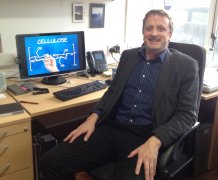
Professor Stephen Eichhorn, who is Chair of the Cellulose and Renewable Materials Division of the American Chemical Society (ACS).
Professor Stephen Eichhorn elected divisional Chair of American Chemical Society
Professor Stephen Eichhorn has been elected as the new divisional Chair at the world’s largest scientific society.
He will head the Cellulose and Renewable Materials Division of the American Chemical Society (ACS), which boasts more than 150,000 members worldwide.
Professor Eichhorn, who is Head of Engineering in Exeter’s College of Engineering, Mathematics and Physical Sciences, is the first UK-based Chair of the division since its inception in the 1920s.
The role, which is held for a three -year period, will see Professor Eichhorn act as a figurehead for international cellulose research, as well as overseeing the Spring meeting programme, the selection of award winners, and developing the Division and its links within ACS.
Speaking after accepting the role, Professor Eichhorn said: “I am delighted to be elected to serve as the new Chair of this division. I've been attending the ACS meetings, and the Cellulose division, since 2001, and have benefitted tremendously from this interaction.
“I hope now to return the favour and help to bring on the younger members and develop the scientific themes of our meetings to attract more people to cellulose research.”
Professor Eichhorn was recently elected as Fellow of the Cellulose and Renewable Materials Division – also the first time a UK scientist has received the honour.
He was selected for the award for his “contributions to the division and the field of cellulose research”. Professor Eichhorn will be formally presented with the Fellowship at a special ceremony, which will be held at the 249th ACS National Meeting & Exposition in Denver, Colorado, in late March.
Professor Eichhorn, who originally trained as a physicist, works closely with engineers, biologists, physicists and chemists. His research focuses on the mechanical properties and interfaces in natural and sustainable materials, particularly cellulose fibres and composites.
He is particularly interested in applying principles from biological structures in engineering applications - or biomimetics - for a variety of applications including composites, smart packaging, energy storage and biofunctional materials. He is both a Fellow of the Institute of Materials and the Royal Society of Chemistry, and is also a member of the Institute of Physics.
Date: 12 March 2015
